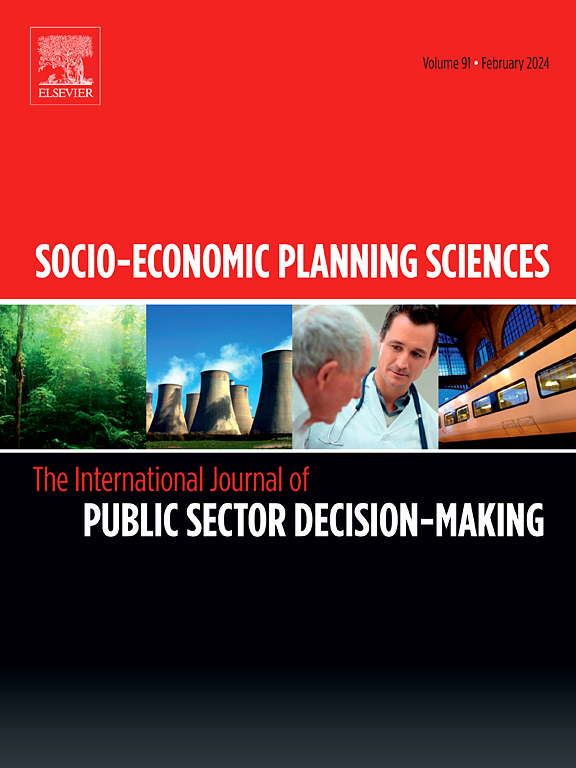管理应急供应的生产能力储备:具有规避损失供应商的公私选择权合同模型
IF 5.4
2区 经济学
Q1 ECONOMICS
引用次数: 0
摘要
利用合同使应急用品储备公私框架协议正式化的做法引起了极大的关注。人道主义决策者越来越关注生产能力储备,而不是实物应急储备。然而,与hdm合作的供应商往往表现出多样化的行为偏好,这可能导致他们的决策偏离完美的理性决策。为了弥补这一差距,本文考虑了一个规避损失的供应商,并建立了产能储备模型,其中产能能够迅速转化为有形产品以满足紧急需求。当局的紧急选项订单数量确定,供应商的生产能力储备数量也确定。对比分析表明,与风险中性主体相比,损失厌恶的供应商可能表现出两种保留偏差,即产能过剩和库存不足。当单位利润期望水平降至零以下时,随着应急物资常规库存水平的降低,库存过剩逐渐转变为库存不足。此外,我们揭示了预订选项的单位成本与紧急采购价格之间的关系,使得供应商的生产能力储备量与当局的订单决策相匹配。同时,提出了人道主义供应链实现协调的两种具体条件。最后,存在一个由所有人道主义成员商定并使其受益的最优保留价格。总体而言,探索个人偏好对应急生产能力储备的影响,为有效管理应急生产能力储备、维护人道主义系统协调、筛选合格供应商提供了重要见解。本文章由计算机程序翻译,如有差异,请以英文原文为准。
Managing production capacity reserves for emergency supplies: A public-private option contract model with a loss-averse supplier
The use of contracts to formalize public-private framework agreements (FAs) for emergency supplies reserves has attracted significant attention. Humanitarian decision-makers (HDMs) are increasingly focused on production capacity reserves besides physical emergency stockpiles. Yet, suppliers cooperating with the HDMs often exhibit diverse behavioral preferences, which may cause their decisions to deviate from perfect rational decision-making. To bridge this gap, this paper considers a loss-averse supplier and builds a model of production capacity reserves, wherein production capacity can be capable of being swiftly converted into tangible products to meet urgent demands. The authority's order quantity of emergency options is determined, as is the supplier's reserve amount of production capacity. A comparative analysis reveals that the loss-averse supplier may exhibit two reservation biases compared to a risk-neutral body, i.e., over- and under-stocking of production capacity. When the aspiration level of unit profit drops below zero, overstocking gradually transitions to understocking as the authority's regular inventory level of emergency supplies lowers. Moreover, we uncover the relationship between the unit cost of booking options and the price of emergency purchases such that the supplier's reserve amount of production capacity matches the authority's order decision. Meanwhile, two specific conditions under which the humanitarian supply chain could achieve coordination are presented. Finally, there exists an optimal reservation price that is agreed on by all humanitarian members and benefits them. Overall, exploring the effects of individual preferences on the stockpiling of emergency production capacity provides significant insights for effectively managing emergency production capacity reserves, maintaining the coordination of the humanitarian system, and screening qualified suppliers.
求助全文
通过发布文献求助,成功后即可免费获取论文全文。
去求助
来源期刊

Socio-economic Planning Sciences
OPERATIONS RESEARCH & MANAGEMENT SCIENCE-
CiteScore
9.40
自引率
13.10%
发文量
294
审稿时长
58 days
期刊介绍:
Studies directed toward the more effective utilization of existing resources, e.g. mathematical programming models of health care delivery systems with relevance to more effective program design; systems analysis of fire outbreaks and its relevance to the location of fire stations; statistical analysis of the efficiency of a developing country economy or industry.
Studies relating to the interaction of various segments of society and technology, e.g. the effects of government health policies on the utilization and design of hospital facilities; the relationship between housing density and the demands on public transportation or other service facilities: patterns and implications of urban development and air or water pollution.
Studies devoted to the anticipations of and response to future needs for social, health and other human services, e.g. the relationship between industrial growth and the development of educational resources in affected areas; investigation of future demands for material and child health resources in a developing country; design of effective recycling in an urban setting.
 求助内容:
求助内容: 应助结果提醒方式:
应助结果提醒方式:


